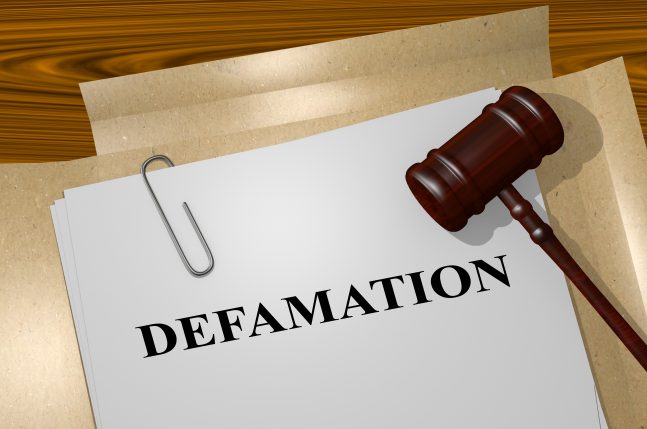What is Internet Defamation
With the widespread use of social media and other online platforms, internet defamation is becoming a growing issue for many people and businesses. But what exactly is defamation? Is it different from slander and libel? Where do you draw the line between a strongly worded critical opinion and a defamatory comment? And do defamation laws apply to those posted online?
By definition, defamation is the act of communicating false statements about a person that can injure their reputation, either by negligence or with malice. This also applies to the reputation of a business or brand. Slander and libel are forms of defamation, slander is spoken defamation while libel is written defamation.
So, are very critical opinions now classified as defamation? No. Defamation does not include statements that are substantially true or those expressed as honest opinions. Simply put, if a statement, comment or review still has some factual basis and there was no negligence or malicious intent to harm, it may not be defamation.
Laws against defamation already exist and their scope varies depending on the country implementing the laws. However, these laws were made at the time before the internet was created. Legislation has a lot of catching up to do with the exponentially growing online world. In general, countries have since applied defamation laws “in real life” and online. Some of them have even passed updated or newer laws specifically for online content.
Internet anonymity has opened the pandora’s box of online abuse. Individuals rarely think of the consequences before posting something on social media and the potential damage that they would cause. Most likely because the risks of getting caught for writing a scathing and baseless comment or review are very slim. The online platforms also do not make removing them easy.
Websites and Their Liabilities or Lack thereof
Social media websites (like Facebook, Instagram and Twitter) and other online platforms (like Google Maps, Google My Business and Tripadvisor) that have user-generated content are the usual hosts to defamatory content since they collectively have the most users. But there are websites that “specialize” in shame posts and complaints. To name a few, RipoffReport, Scam.com, ComplaintsBoard.com and Jerk.com.
How exactly do these websites get away with hosting maliciously written content? Their liability varies depending on the country enforcing their own defamation laws.
Back in 1996, at a time when the internet was still not a major part of our daily lives, the United States Congress passed the Communications Decency Act or CDA (47 U.S.C. § 230). Under this Act, websites like Google are immune from lawsuits related to third-party content using their service. The main reason is to maintain a free flow of ideas and information. The only exceptions to this rule are posts found to be illegal in nature, like intellectual property claims or criminal law violations. This enactment served as a basis or guide for other countries’ own versions of defamation laws.
In the United Kingdom, with Defamation Act 2013, internet service providers are made liable for third-party content posted in their websites if the original author cannot be identified.
In Australia, the Uniform Defamation Laws enacted in the early 2000s make the “primary” publishers or the original authors of the content liable while subordinate publishers will have to prove that they are “innocent disseminators or publishers” and had no idea the content published was harmful or malicious.
Knowing which law applies to your situation will help you figure out whether the content published about you or your business can be removed at your request. This information would be helpful if you include this in your request to remove or delete the content.

Damage Control – What Factors Influence A Person’s Reputation
Being the subject of internet defamation, online harassment or other malicious content greatly impacts your online and real-life reputation, whether as a private person, a brand or business.
To limit the potential PR crisis, you must resort to damage control, and to do that, you have to get the bad press removed or at the very least, suppressed.
So here are some tips for internet defamation removal:
- Communicate with the Person
Directly, not publicly, communicate with the person who posted the defamatory comment or review. Note that this entails that the poster isn’t anonymous or hiding behind a fake identity. Figure out what the actual issue is and if it can be addressed amicably. Request that they remove, retract or at least edit their post. When faced with issues like this, it is best to communicate first before going straight to retaliation or being as aggressive as the poster.
2. Contact the Website
Websites always have their own terms and community guidelines to somewhat control or manage their user-generated content. If the statement directed to you or your business violates the terms and guidelines of the website it is posted on, it is very easy to flag or report the statement. Know that reporting is the easy part, it’s waiting for the response and if they actually respond and act on your request that’s challenging. Websites like Facebook and Google Maps have support centers for flagging or removal of content. For step by step instructions, Remove Digital has articles that will guide you through the process.
If for some reason, the website does not have a support center, a “Contact Us” button or link is usually displayed at the bottom of their homepage.
3. Request Removal from Google Search Results
If you are not able to have the defamatory content removed, another option is to try to stop it from showing up in Google search results. There are several ways to submit a request to Google depending on the kind of information or content you want to have removed.
In limited cases, Google may remove links to the information from Google Search. Specifically, they take in removal requests for private information that creates significant risks of identity theft, financial fraud, or other specific harms. These include non-consexual or intimate photos, fake pornography, and personally identifiable information or doxxing content. If this is what happened to you, click here.
4. Legal Action
Another option is to consult with or hire a defamation lawyer to have them send a cease and desist letter or a court order to have the defamatory content or its URL removed. This will largely depend on applicable laws and regulations in your country, the identity and location of the poster and the website hosting the content. As discussed earlier, different countries have different but similar laws regarding defamation. Informing the website or its webmaster that publishing defamatory content is punishable by law in your own country would most likely help in your bid to have it removed.
Google being the largest online search engine is consequently bombarded with legal requests. As a result, Google now has a dedicated online portal for court order submissions against third parties but not against Google itself.
For court orders against Google and requests for user data, Google does not receive them online. Physical documents for legal processes or subpoenas are to be sent to addresses provided in this page.
Most websites write their physical business addresses and other contact information at the bottom of their pages. If they do not respond via e-mail or customer support, send any requests or letters to the listed addresses.
5. Bury Negative Search Results
Take note of popular social media websites and other online platforms and create your own pages with them. Websites like Facebook and Google always appear higher in search results and having a page or profile with these sites will ensure that your managed profiles will always show up first and overtake any negative results.
If you own a business, build rapport with your clients in person and over the internet and ask them if they could leave reviews. Keep in mind that you should not force, coerce or incentivize your clients or other people to give you glowing recommendations.
6. Seek Help by using Remove Digital
If all of these prove to be too overwhelming, too much work or if you would just like to entrust your online reputation to more capable hands. Remove Digital exists to help you with your internet reputation woes. From content removal to suppression, our team is equipped to help. Contact us at [email protected] to learn more.


